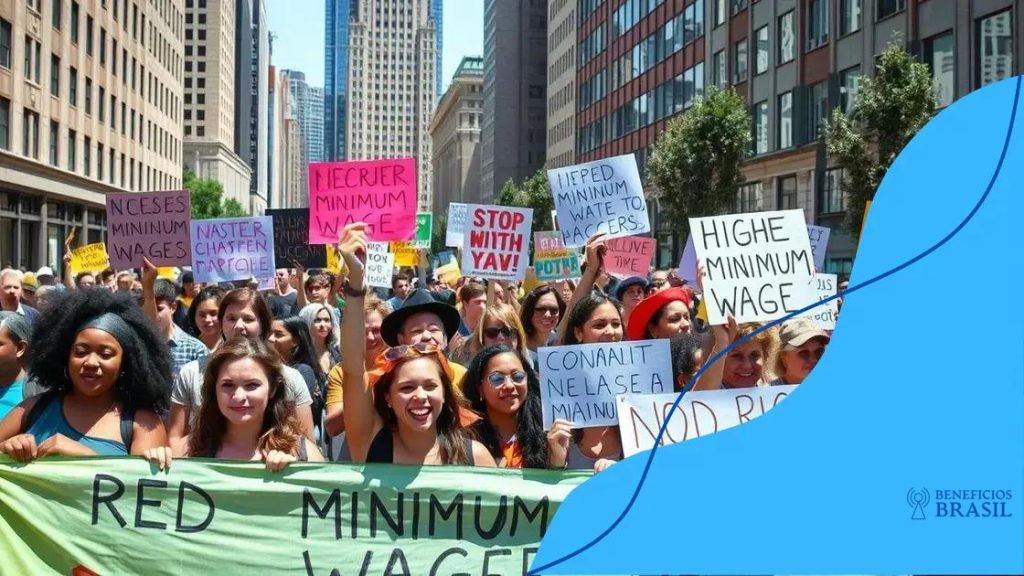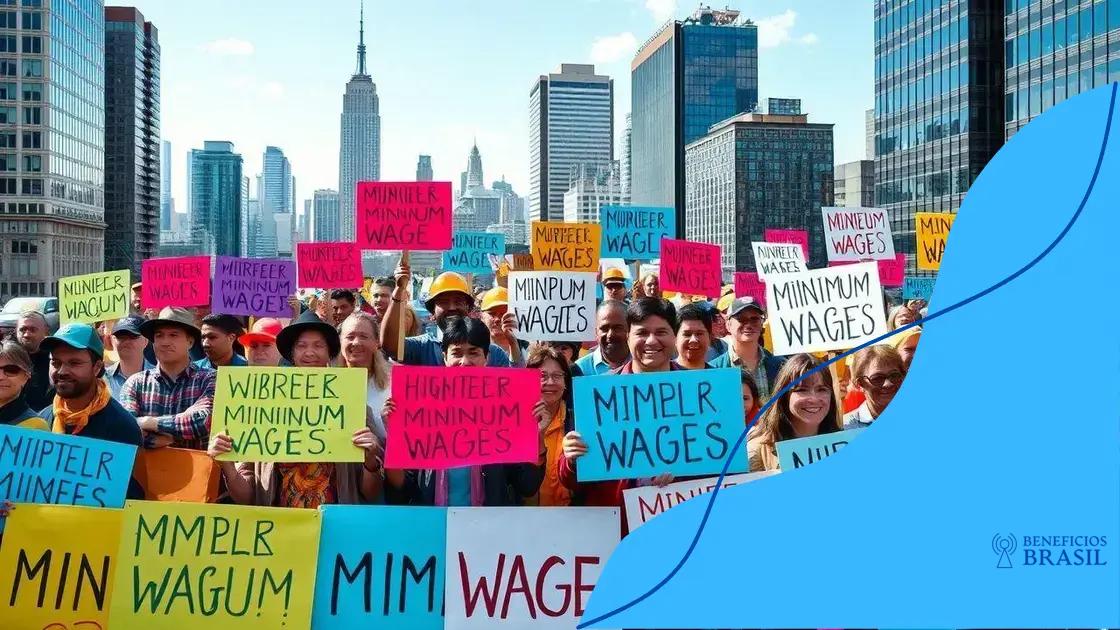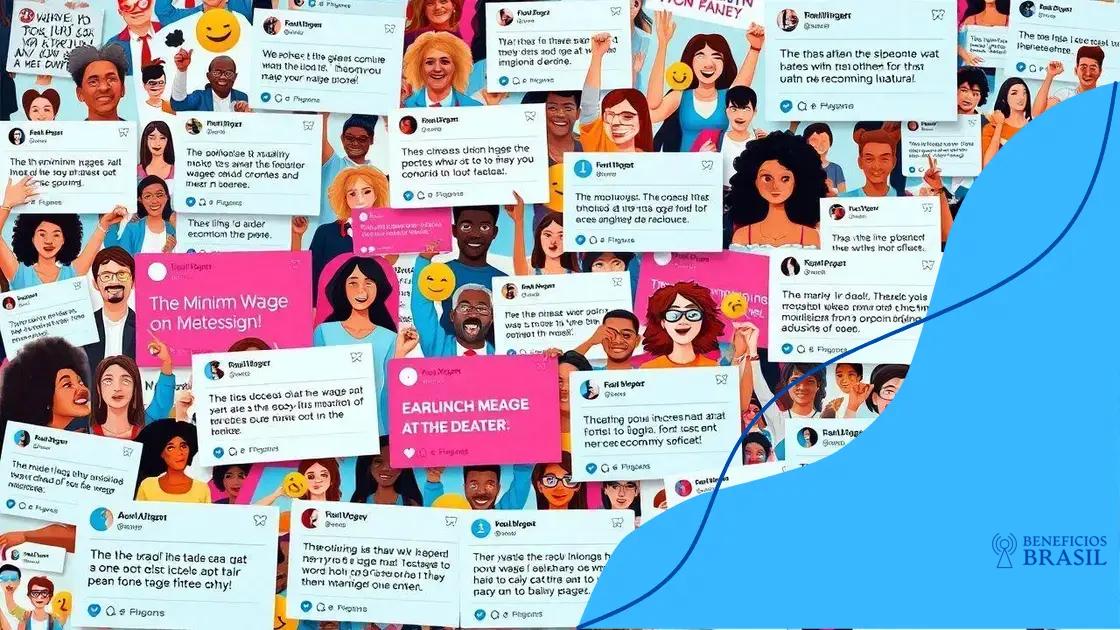Higher minimum wage mobilizations: a push for change

Higher minimum wage mobilizations aim to advocate for fair wages, boost local economies, and reduce poverty, while leveraging social media to increase awareness and support for these critical issues.
Higher minimum wage mobilizations have taken center stage in labor rights discussions. Have you noticed how they’re influencing local economies and policies? Let’s dive into this important movement.
Understanding the history of minimum wage movements
The history of minimum wage movements reflects the ongoing struggle for fair pay. Minimum wage laws have evolved over the years, shaped by economic conditions and social justice advocates. Understanding this history is crucial for recognizing how these movements influence today’s debates.
Origins of Minimum Wage Legislation
Minimum wage laws first emerged in the early 20th century, largely as a response to industrialization. While initially aimed at protecting young workers and women, the framework has gradually expanded. By the 1930s, minimum wage laws gained traction in the United States, driven by labor unions pushing for better pay.
- The Fair Labor Standards Act of 1938 established the first federal minimum wage.
- Throughout the mid-20th century, numerous states began adopting their own minimum wage laws.
- Grassroots campaigns led to the introduction of higher wage initiatives in various regions.
In the 1960s and 1970s, civil rights movements spurred additional changes. Advocates fought for wages that could support a family, arguing that a living wage should be a fundamental right. This period saw significant rallies and mobilizations that raised awareness about income inequality.
Recent Developments in Wage Movements
Today, the conversation around minimum wage is more active than ever. Movements like Fight for $15 have brought renewed attention to the issue, advocating for a national minimum wage increase. Many cities and states have responded by raising their local minimum wage levels, reflecting public support for fair pay.
Understanding the historical context can help us appreciate the challenges faced and the progress made. As mobilizations continue, it’s essential to recognize how past movements inform current practices and policies.
Key arguments for higher minimum wages

Many advocates push for higher minimum wages, and understanding their arguments helps clarify the reasons behind these mobilizations. Higher minimum wages bolster the economy while supporting workers’ rights and dignity.
Economic Boost
Raising the minimum wage can stimulate the economy. When workers earn more, they tend to spend more. This increased spending can lead to higher demand for goods and services, ultimately benefiting local businesses.
- Increased consumer spending drives economic growth.
- More money in workers’ pockets can reduce reliance on government assistance.
- A fair wage can lead to better employee retention, reducing hiring and training costs.
Moreover, higher wages can lead to increased productivity. Employers who offer better pay can boost employee morale, leading to a more engaged workforce.
Reduced Poverty Levels
Raising the minimum wage plays a crucial role in reducing poverty. Many workers earning minimum wage struggle to make ends meet. A higher wage provides them with the means to cover basic necessities.
Research shows that increases in the minimum wage can lift many families above the poverty line. This shift positively impacts the overall quality of life, leading to healthier communities.
When workers have enough income, they can afford better healthcare, education, and housing options. This positive cycle can lead to long-term benefits for individuals and society.
Fairness and Equity
Increased minimum wages also highlight the importance of fairness in pay. Many argue that when people work full-time, they should earn enough to live comfortably. Fair compensation is a fundamental right.
Quoting influential figures, numerous campaigns emphasize that no one should have to work multiple jobs just to get by. As inequality continues to rise, advocating for higher minimum wages becomes even more crucial.
Impact of mobilizations on local economies
Mobilizations for higher wages significantly impact local economies, reshaping communities and businesses. When people come together in support of higher minimum wages, the effects can lead to noticeable economic changes.
Increased Spending Power
One immediate impact of these mobilizations is the increase in spending power for workers. As wages rise, employees have more money to spend on local goods and services. This boost in economic activity can benefit businesses in various sectors, from restaurants to retail.
- Higher income leads to increased demand for products.
- More consumer purchasing power supports local jobs.
- Communities experience economic growth as money circulates.
Small businesses often feel this impact directly. Many report higher sales and customer traffic following wage increases, proving that when workers earn more, everyone wins.
Job Creation and Retention
Mobilizations also lead to job creation and retention. As local economies improve, businesses are more likely to expand and hire, supporting new job opportunities. Additionally, when employees feel valued with fair wages, they are more likely to stay with their employers, reducing turnover.
Reduced turnover saves businesses money on training and recruitment costs. A stable workforce can create a more productive environment, directly contributing to business growth.
Social and Community Benefits
Beyond economics, mobilizations for higher wages foster stronger communities. When local workers earn fair pay, they can invest in housing, education, and healthcare, which enhances community well-being. Stronger communities make for an overall healthier local economy.
Furthermore, communities that support higher wages often see increased participation in civic activities. This engagement encourages collaboration among residents and local leaders to address broader social issues.
Role of social media in mobilizing support

Social media plays a crucial role in mobilizing support for higher minimum wages. In today’s digital age, platforms like Twitter, Facebook, and Instagram allow advocates to reach a larger audience quickly and effectively. This form of communication has transformed how movements gain momentum.
Spreading Awareness
Through social media, organizations can raise awareness about minimum wage mobilizations. Posts can inform followers about upcoming events, share personal stories, and spread statistics about wage disparities. This information empowers users to participate actively and support this cause.
- Social media campaigns can highlight local protests and rallies.
- Influencers can amplify messages, reaching diverse audiences.
- Information can be shared quickly, facilitating a rapid response.
When people see their friends or respected figures engaging with these campaigns, they are more likely to join in. The community aspect of social media fosters a sense of belonging in movements that may otherwise feel overwhelming.
Creating Online Communities
Social media not only raises awareness but also helps create online communities. People can connect with others who share their views on minimum wage issues. These connections strengthen collective action. Support groups and discussion forums allow individuals to share strategies, experiences, and resources.
These virtual communities often lead to in-person events, further solidifying support for minimum wage initiatives. The shared goal encourages collaboration and enhances commitment among activists.
Engaging Younger Audiences
Young people are particularly active on social media, making it an ideal platform to engage this demographic. By utilizing compelling visuals and relatable content, movements can attract younger audiences who may not be aware of the struggle for fair wages.
Social media campaigns can include hashtags that resonate with youth culture, allowing younger generations to take pride in their involvement. This engagement can lead to a new wave of activists championing the cause.
Future of minimum wage debates in the U.S.
The future of minimum wage debates in the U.S. is both complex and dynamic. As the cost of living continues to rise, discussions around higher minimum wages gain urgency. Policymakers, workers, and business owners are all engaged in this conversation, each bringing their perspectives.
Potential Changes in Legislation
In upcoming years, we may see significant changes in minimum wage laws at both state and federal levels. Advocates argue that raising the federal minimum wage is essential for addressing income inequality. On the other hand, opponents often cite concerns about job losses and business impacts.
- Proposals for gradual wage increases are being discussed in various states.
- Some cities have already implemented higher minimum wages, leading to mixed results.
- National campaigns are pushing for a living wage that aligns with the cost of living.
This push for legislative change is fueled by grassroots movements and public support. Surveys indicate that many Americans favor increasing the minimum wage, reflecting a shift in public opinion.
Impact of Economic Conditions
The overall economic conditions will also shape future debates. Factors like inflation, unemployment rates, and the strength of the job market impact how discussions evolve. In times of economic growth, advocates may find more support for their causes.
Conversely, during economic downturns, fears about job losses can stifle progress. The balance between ensuring fair wages and maintaining a robust economy remains a key point of debate.
The Role of Technology and Automation
As technology continues to advance, the future of work will also influence minimum wage discussions. Automation is changing the job landscape, with many entry-level positions potentially disappearing. This shift raises questions about the viability of a minimum wage in certain sectors.
Some argue that higher minimum wages could accelerate automation, while others believe that fair compensation is crucial for workers who remain in the workforce. Finding solutions that benefit both employees and businesses will be essential.
FAQ – Frequently Asked Questions about Minimum Wage Mobilizations
What is the main goal of minimum wage mobilizations?
The main goal is to advocate for fair compensation that allows workers to meet their basic needs and improve their quality of life.
How can social media influence minimum wage movements?
Social media helps in spreading awareness and mobilizing support by connecting advocates and sharing information quickly across a wide audience.
What are some economic impacts of raising the minimum wage?
Raising the minimum wage can lead to increased consumer spending, reduced poverty levels, and overall economic growth in local communities.
Why is public opinion important in minimum wage debates?
Public opinion shapes policies and encourages lawmakers to consider the needs of workers, which can drive legislative changes in minimum wage laws.
